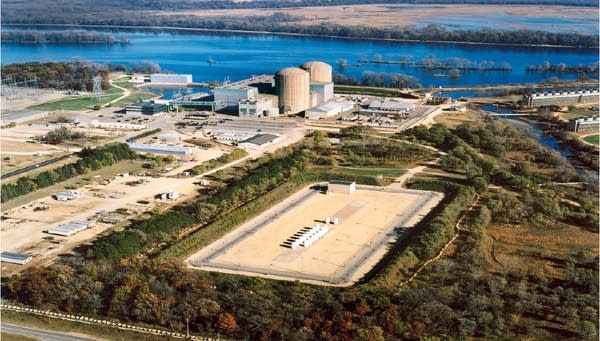Minn. House backs move toward more nuclear power
Go Deeper.
Create an account or log in to save stories.
Like this?
Thanks for liking this story! We have added it to a list of your favorite stories.

The Minnesota House followed in the footsteps of the Senate Thursday night and approved a measure to remove the moratorium on new nuclear power plants in the state.
The bill was offered by Rep. Joyce Peppin, R-Rogers, who lives near Xcel Energy's Monticello nuclear plant.
"This is simply removing the ban. It does not mean there's going to be a nuclear power facility built tomorrow," she said. "In fact, even if it were removed today it would be at least 10 to 15 years before a plant would be in place."
Peppin said the moratorium prevents the state from considering all its options, and renewable sources of energy won't be enough to provide for future needs.
Turn Up Your Support
MPR News helps you turn down the noise and build shared understanding. Turn up your support for this public resource and keep trusted journalism accessible to all.
The moratorium dates from 1994, when Xcel was running out of room in its Prairie Island plant to store spent fuel. The company asked for permission to store waste in casks on a concrete pad next to the plant.
It was one of the most hotly-debated issues ever to come before the Legislature.
Rep. Lyndon Carlson, DFL-Crystal, was on the conference committee that agreed to the deal. No new nuclear plants could be built, but the Prairie Island plant could store radioactive waste above ground.
"That was temporary; until the permanent storage site was found," he said. "We have the same issue today that we had in 1994 -- no permanent storage."
Advocates of lifting the ban said the federal government will eventually find a place to dispose of the growing amount of waste being generated around the country.
Supporters -- mostly Republicans -- beat back several amendments offered by Democrats. Rep. Bill Hilty, DFL-Finlayson, offered one that said a utility building a nuclear plant couldn't start charging its customers to pay for the plant until it became operational.
Hilty said most nuclear plants being built around the world are experiencing huge cost over-runs, and some are canceled before they're built.
"What this amendment is saying is: if you want to do this project, do it the way every other project is done. Tell us up front what it's going to cost, then keep your word, and if you can't don't expect somebody else to pick up the tab," he said.
Other amendments called for protections for people living near a future nuclear plant.
But the only amendment that won approval stipulates that a nuclear plant cannot process weapons-grade plutonium.
In the end, the vote was 81-to-50 in favor of ending the nuclear moratorium.
Majority Leader Matt Dean, R-Dellwood summed up the thoughts of those who voted yes.
"We've heard the debate here today that when this bill passes it'll still be 10 years or so before we have a new nuclear power plant, and that is true," he said. "But the bill passage today sends a stronger signal that Minnesota is open for business."
The Senate passed a similar bill earlier this month. Since each has an amendment, they'll need to go to a conference committee.
The House amendment addresses one of Gov. Mark Dayton's concerns -- that plutonium could be created as a by-product. But his other objections to expanded nuclear power remain -- the problem of waste storage, and the risk to ratepayers and taxpayers because of the high cost of nuclear plants.
The nuclear bill is just one of several aimed at re-writing much of Minnesota's energy policy.
One bill would eliminate restrictions on new coal-fired power plants. Others would remove Minnesota's renewable energy standard and energy conservation goals.
Dear reader,
Political debates with family or friends can get heated. But what if there was a way to handle them better?
You can learn how to have civil political conversations with our new e-book!
Download our free e-book, Talking Sense: Have Hard Political Conversations, Better, and learn how to talk without the tension.




